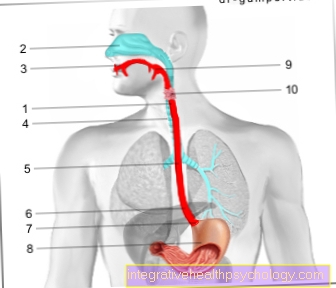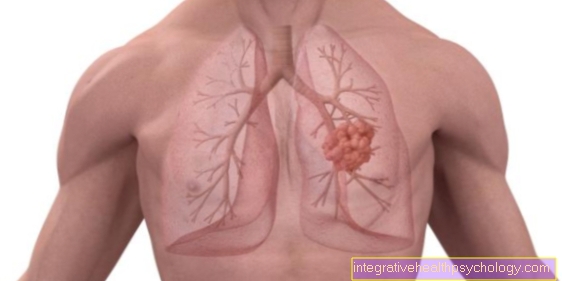Theophylline
General
Theophylline is a drug from the group of methylxanthines and is used in particular in asthma therapy because of its effect. It belongs to the same substance class as caffeine, for example, but in addition to its central effect it has the additional property that it has a bronchodilator effect.
Administration and dosage

Theophylline is a prescription drug and can be given orally for asthma prophylaxis and, in acute cases, parenterally, i.e. directly into the bloodstream, to break through an attack. On the one hand you can take theophylline as tablets and capsules and on the other hand also in drop form. A distinction is made between preparations that release the active ingredient directly, which are needed in an acute attack, and those in which the active ingredient is released with a delay. These are not to be used in acute cases, but rather for patients with long-term therapy. Theophylline is not the drug of choice for treating asthma in children.
The theophylline dose is calculated according to body height and body weight, whereby the serum level of theophylline should also be checked in order to set the effective level correctly. Depending on the age or in smokers, the substance can be broken down more slowly or more quickly, which should be taken into account when determining the dosage.
Incorrect intake or dosage can also lead to an overdose of theophylline. This can cause seizures and Arrhythmias or other limitations of the Brain or Heart occur. Circulatory failure can also occur without any previous minor side effects.
Contraindications and interactions
The use of theophylline is therefore contraindicated under certain circumstances. Theophylline is not to be taken by a well-known one Hypersensitivity of the drug, after a fresh one Heart attack or at Cardiac arrhythmias with increased heart rate.
Theophylline can be taken during pregnancy and breastfeeding, but careful attention must be paid to the dosage. Exactly the same should be done with diseases like Hyperthyroidism, Stomach ulcer, severe blood pressure problems and liver- and Kidney dysfunction be careful when taking theophylline.
In addition, it can be especially with simultaneous consumption of alcohol and other medications, your ability to react and thus your ability to drive may be restricted.
Since there are many known interactions between theophylline and other drugs, the doctor should be informed to avoid possible interactions, even if they are substances that are not available on a prescription.
Caffeinated foods like coffee can increase the effect of theophylline, whereas smoking can weaken the effect by breaking down the substance too quickly. The absorption of theophylline from the digestive tract into the blood is simplified after ingestion, which is why it is beneficial to take theophylline after meals.
Side effects
Theophylline side effects can also occur with properly adjusted therapy. These include headaches, restlessness and dizziness. In addition, the heart rate can change or problems in the gastrointestinal tract, such as nausea or increased reflux (heartburn) especially at night. If there are signs of an overreaction such as itching, hives or rash, theophylline must not be taken repeatedly.
Since some side effects can have serious consequences, a doctor should be consulted under certain circumstances and the therapy readjusted.













.jpg)















